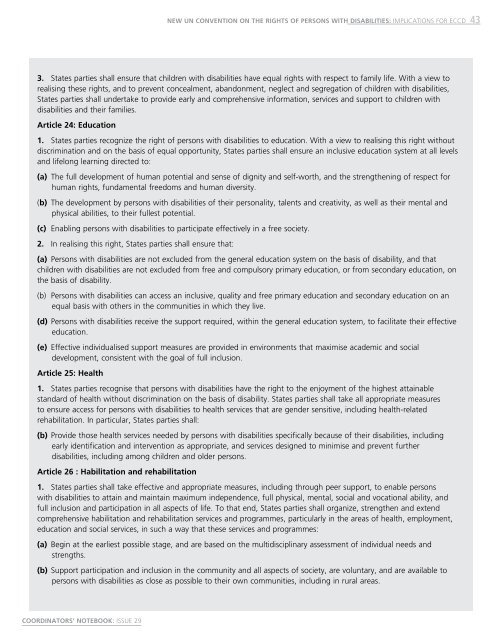A global call to action for early childhood
A global call to action for early childhood
A global call to action for early childhood
Create successful ePaper yourself
Turn your PDF publications into a flip-book with our unique Google optimized e-Paper software.
New UN Convention on the Rights of Persons with Disabilities: Implications <strong>for</strong> ECCD<br />
43<br />
3. States parties shall ensure that children with disabilities have equal rights with respect <strong>to</strong> family life. With a view <strong>to</strong><br />
realising these rights, and <strong>to</strong> prevent concealment, abandonment, neglect and segregation of children with disabilities,<br />
States parties shall undertake <strong>to</strong> provide <strong>early</strong> and comprehensive in<strong>for</strong>mation, services and support <strong>to</strong> children with<br />
disabilities and their families.<br />
Article 24: Education<br />
1. States parties recognize the right of persons with disabilities <strong>to</strong> education. With a view <strong>to</strong> realising this right without<br />
discrimination and on the basis of equal opportunity, States parties shall ensure an inclusive education system at all levels<br />
and lifelong learning directed <strong>to</strong>:<br />
(a) The full development of human potential and sense of dignity and self-worth, and the strengthening of respect <strong>for</strong><br />
human rights, fundamental freedoms and human diversity.<br />
(b) The development by persons with disabilities of their personality, talents and creativity, as well as their mental and<br />
physical abilities, <strong>to</strong> their fullest potential.<br />
(c) Enabling persons with disabilities <strong>to</strong> participate effectively in a free society.<br />
2. In realising this right, States parties shall ensure that:<br />
(a) Persons with disabilities are not excluded from the general education system on the basis of disability, and that<br />
children with disabilities are not excluded from free and compulsory primary education, or from secondary education, on<br />
the basis of disability.<br />
(b) Persons with disabilities can access an inclusive, quality and free primary education and secondary education on an<br />
equal basis with others in the communities in which they live.<br />
(d) Persons with disabilities receive the support required, within the general education system, <strong>to</strong> facilitate their effective<br />
education.<br />
(e) Effective individualised support measures are provided in environments that maximise academic and social<br />
development, consistent with the goal of full inclusion.<br />
Article 25: Health<br />
1. States parties recognise that persons with disabilities have the right <strong>to</strong> the enjoyment of the highest attainable<br />
standard of health without discrimination on the basis of disability. States parties shall take all appropriate measures<br />
<strong>to</strong> ensure access <strong>for</strong> persons with disabilities <strong>to</strong> health services that are gender sensitive, including health-related<br />
rehabilitation. In particular, States parties shall:<br />
(b) Provide those health services needed by persons with disabilities specifi<strong>call</strong>y because of their disabilities, including<br />
<strong>early</strong> identification and intervention as appropriate, and services designed <strong>to</strong> minimise and prevent further<br />
disabilities, including among children and older persons.<br />
Article 26 : Habilitation and rehabilitation<br />
1. States parties shall take effective and appropriate measures, including through peer support, <strong>to</strong> enable persons<br />
with disabilities <strong>to</strong> attain and maintain maximum independence, full physical, mental, social and vocational ability, and<br />
full inclusion and participation in all aspects of life. To that end, States parties shall organize, strengthen and extend<br />
comprehensive habilitation and rehabilitation services and programmes, particularly in the areas of health, employment,<br />
education and social services, in such a way that these services and programmes:<br />
(a) Begin at the earliest possible stage, and are based on the multidisciplinary assessment of individual needs and<br />
strengths.<br />
(b) Support participation and inclusion in the community and all aspects of society, are voluntary, and are available <strong>to</strong><br />
persons with disabilities as close as possible <strong>to</strong> their own communities, including in rural areas.<br />
COORDINATORS’ NOTEBOOK: ISSUE 29
















